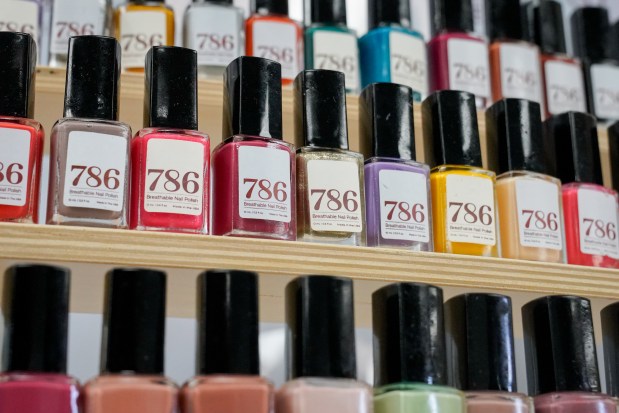Buying nail polish or ordering frozen meat for delivery can seem pretty routine. But one Chicagoland couple is working to make such products and services more readily available and accessible to America’s growing Muslim population.
Iqra Isphahani, 30, and her husband, Ibrahim Ali, 33, own 786 Cosmetics and Boxed Halal. The couple, who live in Barrington, started the businesses after identifying needs within the Muslim community that they wanted to help meet.
“There’s such a huge Muslim community in Illinois,” Isphahani said. “We’re surrounded by this community and we see the struggle to find the products they need.”
Isphahani said she has noticed an upward trend in halal products on store shelves in recent years. For example, she found that certain nutrition supplements she was getting for her two sons also had halal certification.
“People are starting to see the value in halal products and what that means, and they’re caring more about making products available to the Muslim community, which is a big part of the U.S. and deserves products that they can use comfortably without any worry of it messing with their spiritual side of life,” Isphahani said.
Fundamentally, halal means something permissible for Muslims. More commonly used when talking about food, halal is used nowadays to describe all kinds of products and acts allowed in Islam.
786 Cosmetics started in 2017 with the goal of tackling nail polish, a “pretty tricky topic for the Muslim world,” Isphahani said.. Muslims are required to make wudu before saying their five daily prayers. Wudu is a way of cleansing oneself before praying, and nail polish can be seen as a barrier to the nails during the process, she said, because water can’t pass through the polish to cleanse the nail.
In comes 786, which offers halal-certified, wudu-safe nail polishes that were formulated and lab-tested to make sure they are water-permeable, or that water could pass through. The nail polishes went through many iterations to uphold the wudu requirement without sacrificing on quality and clean ingredients, Isphahani said.
“We’re creating something for a community that is often overlooked in the beauty space, and we’re bringing awareness to the need for halal products overall,” she said.
Each nail polish is tested individually, she said, and the certification process is extensive but worth it to ensure the product can be trusted. Isphahani added that transparency is important to their brand, and more information about the products and their certifications is available online.
Isphahani said 786 has gotten a lot of positive feedback from the Muslim community, which is “the best part” of the journey.
“They were really excited that they finally got an opportunity to be able to wear nail polish or be able to wear nail polish without feeling guilty about it,” she said.
All of 786’s nail polishes are named after places around the world, like different shades of pink named Hyderabad, Beirut, Jaipur, Nizwa and Tokyo, or neutrals like Abu Dhabi and Giza.
With nearly 70,000 followers on Instagram, 13,000 on Facebook and over 7,000 on TikTok, social media comment sections offer a glimpse at the positive feedback the brand gets. Plenty of heart-centric emojis stamp many of the posts, along with users asking for nail polish shade names and announcing their favorites. Under one Instagram post, a user wrote that the shade “Tyre has my heart,” while another commented, “will Bahrain be coming back in stock?”
The nail polishes are vegan, cruelty-free and all made in the U.S., Isphahani said, making them also appealing to non-Muslims amid a shift to cleaner, greener products.
The company’s warehouse is in Schaumburg, where all orders are filled, packaged and shipped. The team is made up of about five people, Isphahani said, and 786 is “very much small business vibes,” with even family members helping out during busy sales seasons like Ramadan, which begins next week.
While not in a store of its own, the team has worked with some retailers. 786 previously had a limited release with Bath and Body Works and also was sold at Macy’s and T.J.Maxx, Isphahani said.
Also, 786 franchises in Pakistan and the United Arab Emirates are promoting the product and getting nail polishes into mall kiosks and local salons, Isphahani said. 786 Cosmetics ships worldwide.
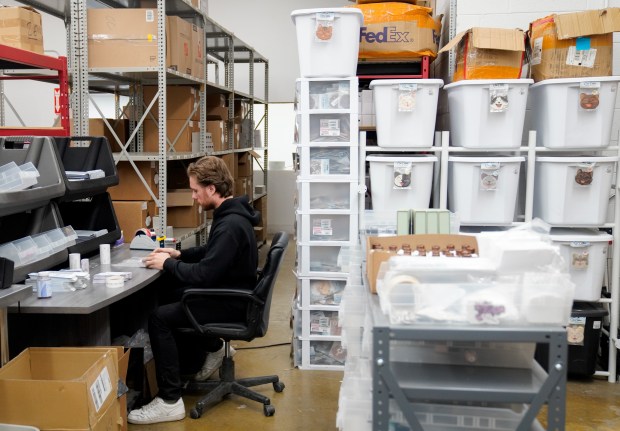
786 also sells some nail tools, like a manicure set, and sold out of the halal biotin gummies, which were plant-based and halal-certified. Down the line, Isphahani said, she would like to expand 786 with more halal-certified beauty products, whether in makeup or skin care.
Other goals are to work with more retailers to expand the in-store presence as well as creating more color options, she said.
The name 786 is a cultural homage to Muslims, Isphahani said, as the numbers are often used as a symbol for bismillah, a word that roughly translates to “in the name of God” in Arabic.
Isphahani graduated from DePaul University in 2016 with a degree in economics and worked in the payments industry. She was working full-time when she and her husband created 786, then she transitioned to working on 786 full-time in 2021.
The couple previously started another business in 2019, Boxed Halal, a subscription-based halal meat delivery service that makes halal meat shopping more accessible.
Ali said the idea was inspired by them learning that a relative of Isphahani’s in the Las Vegas area would travel over an hour to get halal meat. After doing some research online, Ali said, he wanted to pursue a convenient alternative to halal meat shopping and got to work on Boxed Halal.
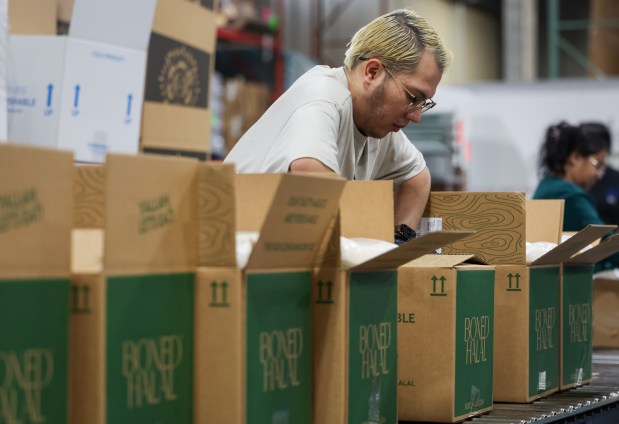
In Islam, halal meat comes from an animal that was hand-slaughtered instead of machine-cut in a way that aims to ensure the animal does not suffer and is treated humanely. Not only did their meat need to be halal, it also needed to be high-quality, Ali said.
“We both grew up eating halal and understood the importance of it,” he said. “It’s also about understanding where the meat is coming from, how the animals are treated. It’s really important and we want it to be available for everybody. It shouldn’t be a hassle.”
After finding the right suppliers, Ali said, he created a website and started getting orders “right away.”
The business continued to grow and hit a boom, particularly early in the COVID-19 pandemic when many were stuck at home ordering in. Eventually, the small team had to outsource to a warehouse in Wheeling for inventory, order fulfillment and shipping. The team’s responsibilities still include taking orders from vendors, marketing and customer service.
Ali said Boxed Halal will soon launch with Publix, a grocery chain in some southern states, and has a current partnership selling through Costco’s website.
Boxed Halal ships all over the U.S., Ali said, using an insulated liner and dry ice in the box so that orders can be guaranteed fresh.
The meat options are “almost everything that you’d get at a butcher shop,” from steaks, Wagyu beef and burgers to different cuts of chicken and goat meat sourced from New York, New Zealand and Australia, Ali said. The meat, all hand-slaughtered and free from antibiotics and hormones, comes to customers frozen and vacuum-sealed.
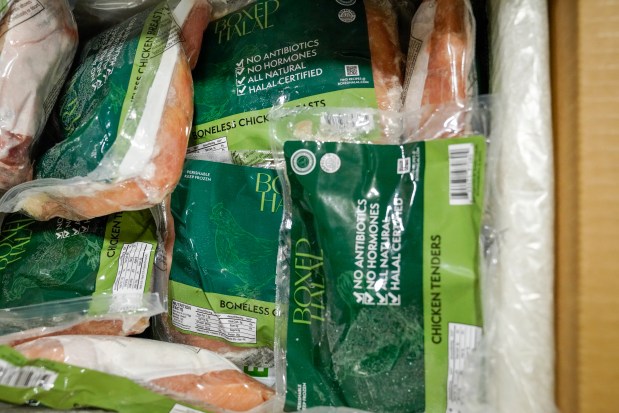
In fact, Ali said, Boxed Halal’s biggest markets “surprisingly” are in New York and New Jersey, where the Muslim communities are vast and halal grocery is plentiful, “but delivery culture is very big out there.”
Sara Ali, no relation to Ibrahim Ali, is a content creator from New York who partners with Boxed Halal to develop recipes with the halal meat. She said “the day to day gets so busy that you’re not always going to have the time to go to the butcher shop,” which is why she finds Boxed Halal to be a welcomed option.
“Also, the really popular halal stores here, they are always busy, so you’re not going to be in and out,” she said. “It’s going to take a long time, and sometimes they sell out, so you never know what you’re actually going to get.”
Boxed Halal is a guaranteed option, she said, where customers pick exactly what they want. She said she likes using Boxed Halal because of the “high-quality meat” and the variety.
“I think their transparency also sets them apart, just because a lot of times it is hard to find out where exactly your meat is sourced from, and I love that they have that information on their website,” Sara Ali said.
A couple of her favorite recipes she has developed so far are the loaded beef shawarma fries using a “really nice piece of steak” and air fryer chicken skewers with a garlic butter sauce. Both recipes, she added, can be made in 30 minutes or less.
Boxed Halal has over 20,000 followers on Instagram, over 7,000 on Facebook and a couple hundred TikTok followers. Several people have taken to social media to post videos of them using and reviewing the meat, with comments underneath a Wagyu beef burger post talking about the Boxed Halal product cooking up “so juicy” and “flavorful.”
One user captioned her review of the beef jerky on TikTok thanking Boxed Halal for “great quality halal meats,” adding that she hadn’t had jerky since converting to Islam 10 years ago, “so this was really nice to be able to eat jerky.”
Ali said he hopes to keep growing Boxed Halal’s subscriber base and retail presence and is open to other opportunities to make products and services Muslim-friendly in the future.
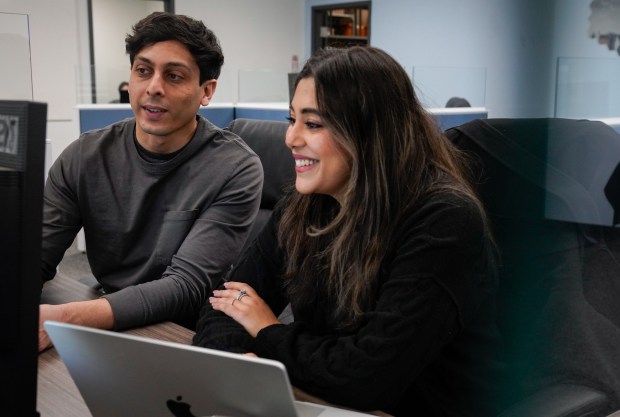
He has always had this entrepreneurial spirit, he said, having started to “sell stuff online to make extra money” at a young age.
“If there’s something else that comes across, we’d definitely like to pursue it,” Ali said. “I love doing stuff like that. It’s really fulfilling. It feels great knowing that people are using your service and they liked it, and they’re leaving positive reviews.”


